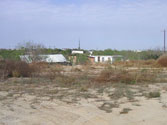Lots in D-5 Acres subdivision lacking water, sewage facilities
AUSTIN – Texas Attorney General Greg Abbott has charged the developer of D-5 Acres, a subdivision in Webb County, with violating the state’s colonia-prevention laws. According to court documents filed by the state, John R. Daves and his wife, Leonor Daves, failed to install or bond sewer and water services on residential lots offered for sale in the subdivision.
“This enforcement action seeks to bring this Webb County development into compliance with the state’s colonia-prevention laws,” Attorney General Abbott said. “Texas law requires border-area developers to guarantee that basic water and wastewater infrastructure will be installed before lots are sold to unsuspecting purchasers. We will continue investigating and prosecuting wrongdoers who violate colonia-prevention laws.”
 According to the Attorney General’s petition, which was filed in Travis County district court, the defendants subdivided a tract into 42 lots for residential use. The defendants recently sold three lots lacking utilities for about $27,000 each. State authorities assert the Daveses’ failure to build or bond water and wastewater infrastructure violate numerous provisions of the Texas Local Government Code. The Daveses could face penalties of up to $15,000 for each lot sold. The OAG also seeks to prevent the defendants from continuing to sell lots illegally and is asking the court to force them to either meet the necessary platting and infrastructure requirements or refund the purchasers’ money.
According to the Attorney General’s petition, which was filed in Travis County district court, the defendants subdivided a tract into 42 lots for residential use. The defendants recently sold three lots lacking utilities for about $27,000 each. State authorities assert the Daveses’ failure to build or bond water and wastewater infrastructure violate numerous provisions of the Texas Local Government Code. The Daveses could face penalties of up to $15,000 for each lot sold. The OAG also seeks to prevent the defendants from continuing to sell lots illegally and is asking the court to force them to either meet the necessary platting and infrastructure requirements or refund the purchasers’ money.
The case against the Daveses is one of four South Texas colonias cases recently pursued by the OAG. In November 2007, the OAG obtained a temporary injunction against Manuel Montemayor, a developer who was offering unapproved lots for sale in Cameron County. Attorney General Abbott also filed legal action against rural housing project developer Aurora Graham for failing to obtain plat approval or to install or bond sewer and water services on residential lots she sold in rural Cameron County. In 2006, the OAG concluded a similar case in Cameron County against Eric Solis, who sold lots in a colonia known as Toribio Estates.
In Texas, unincorporated residential subdivisions near the U.S.-Mexico border that lack adequate water and sewage services are commonly referred to as colonias. Most colonias lie outside city limits or in isolated areas of a county and lack even basic infrastructure and utilities. Residents often must haul water, go without electricity and risk higher incidence of disease.
Before purchasing residential property outside city limits, border area purchasers should check with county officials to confirm the property was legally subdivided and that the developer has made necessary arrangements to supply required infrastructure.
Consumers can file complaints with the OAG against developers or sellers who fail to provide water and wastewater services, or who subdivide land without first obtaining necessary county approval. Complaints can be filed on the Attorney General’s Web site at www.oag.state.tx.us or by calling (800) 252-8011.
The Office of the Attorney General also maintains the state’s Colonia Geographic Database, which offers geographic and descriptive data on more than 1,800 colonias. To access the database, or for more information regarding Attorney General Abbott’s colonias-prevention efforts, visit the “Texas-Mexico Border” page on the Attorney General’s Web site.








